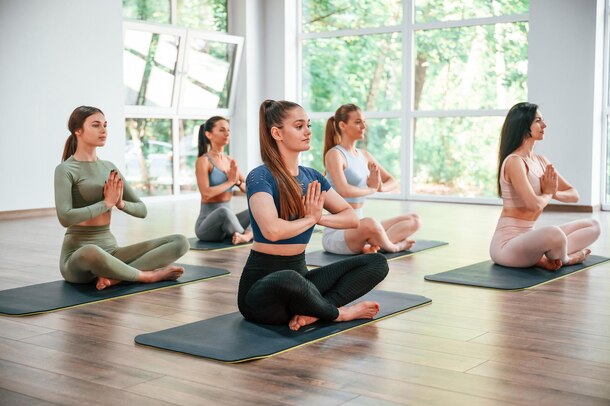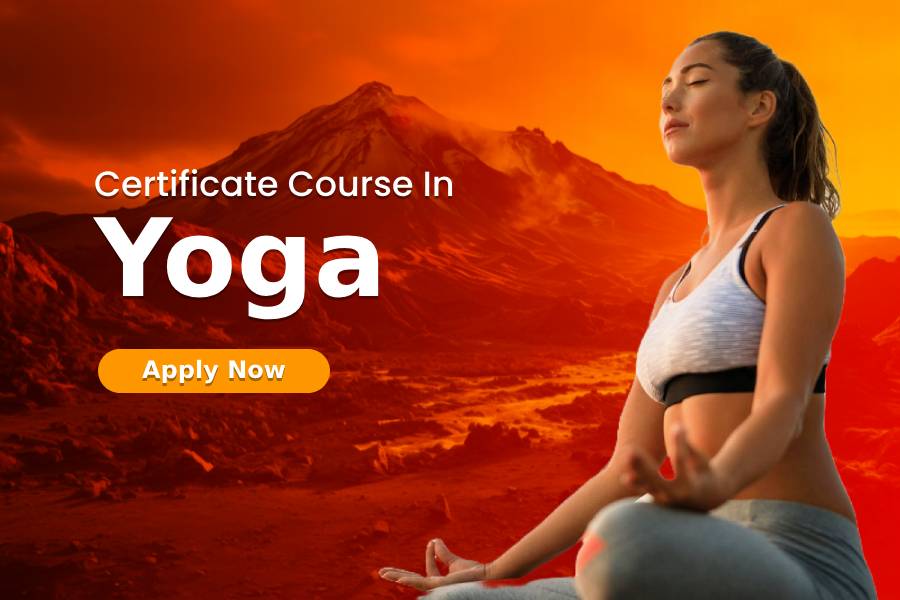A Certificate Course in Yoga holds significant importance in promoting holistic well-being. It provides a comprehensive understanding of yoga's principles, encompassing physical, mental, and spiritual dimensions. This course is valuable for individuals seeking personal transformation, stress management tools, and a balanced lifestyle. This blog unravels the intricacies of pursuing a Certificate Course in Yoga in India, with a specific focus on the upcoming admission season in 2024, guided by the esteemed institution, SKVV.
Table of Content
Certificate Course in Yoga: An Introduction
The Certificate Course in Yoga is a transformative journey that delves into the profound principles and practices of yoga. From mastering asanas and pranayama to understanding the philosophy behind this ancient discipline, the course aims to instill a comprehensive understanding of yoga's physical, mental, and spiritual dimensions.
The versatility of the Certificate Course in Yoga makes it suitable for a diverse range of individuals. Whether you're a fitness enthusiast, a healthcare professional looking to integrate holistic practices, or someone with a genuine passion for yoga, this course welcomes participants from various backgrounds and experiences.
Why should someone opt for a Certificate Course in Yoga?
Studying the Certificate Course in Yoga goes beyond physical exercise; it is a commitment to personal growth and well-being. The course equips individuals with tools to lead a balanced life, manage stress, and contribute to the health and happiness of themselves and others.
This course is ideal for fitness enthusiasts, healthcare professionals, educators, and anyone passionate about promoting a healthy lifestyle. Whether you are a beginner or an experienced practitioner, the Certificate Course in Yoga caters to a diverse audience.
The decision to pursue the Certificate Course in Yoga is often rooted in a desire for personal transformation and a commitment to well-being. This course offers more than a physical workout; it provides tools for managing stress, fostering mental clarity, and cultivating a harmonious balance between mind, body, and spirit.
Eligibility Criteria for Certificate Course in Yoga
To embark on this yogic journey, candidates must fulfil specific eligibility criteria. These may include educational qualifications, age limits, and a genuine passion for yoga.
SKVV sets standards that ensure a conducive learning environment for all participants.
- Educational Qualifications: Prospective students are typically required to have completed their secondary education, holding a valid certificate or diploma. Educational qualifications may vary between institutions, but a foundational educational background is a common criterion.
- Minimum Aggregate Score: Institutions often specify a minimum aggregate score from the candidate's previous educational qualifications. This score serves as an indicator of the individual's academic aptitude and commitment to their studies.
- Background in Yoga Studies: While not always mandatory, having a background or previous exposure to yoga studies can be advantageous. Some institutions may favor candidates who have attended workshops, seminars, or short courses in yoga, showcasing a genuine interest in the discipline.
- Age Requirements: Many institutions set specific age criteria for admission. This criterion ensures that participants are in an age bracket conducive to effective learning and physical engagement in yoga practices. Age limits may vary, with some institutions emphasizing a minimum and maximum age range.
- Health and Fitness Standards: Given the physical nature of yoga practices, institutions may establish health and fitness standards for participants. A medical examination or fitness assessment may be required to ensure that individuals can actively engage in the various aspects of the course.

Certificate Course in Yoga Admission 2024 Process
The upcoming admission season for 2024 holds promises of self-discovery and empowerment through the Certificate Course in Yoga. Prospective students can anticipate a seamless and supportive admission process, guiding them toward a life-enriching experience.
The admission process, a gateway to this immersive experience, stands as a testament to the institution's commitment to fostering a community of dedicated learners. This section unfolds the tapestry of expectations, key dates, and steps that not only streamline the admission process but also lay the foundation for a soul-enriching yogic expedition.
The admission process involves a series of steps, including submitting an application, possibly attending an entrance exam or interview, and meeting the eligibility criteria. Aspiring yogis can find a welcoming gateway to the transformative world of yoga through SKVV's admission process.
Navigating the admission process becomes seamless when applicants are well-informed about the steps involved. This section aims to demystify the process, offering a roadmap that eases prospective students into the transformative experience that awaits.
- Application Submission: Initiate the journey by submitting a comprehensive application. This typically involves filling out an online form, providing educational and personal details, and possibly attaching relevant documents.
- Entrance Exams or Interviews: For some institutions, an additional step involves entrance exams or interviews. Prepare thoroughly by revisiting key yoga principles, understanding the institution's ethos, and being ready to articulate your passion for yoga.
- Document Verification: Once selected, the institution may require candidates to undergo document verification. Ensuring that all necessary documents are in order simplifies this step.
- Admission Confirmation: Celebrate the joyous moment of receiving the admission confirmation. This official communication seals the commitment between the institution and the aspiring yogi.
- Orientation and Welcome Sessions: Institutions often organize orientation and welcome sessions to acclimate new students. These sessions provide insights into the curriculum, introduce faculty members, and foster connections among peers.
- Commencement of Classes: The much-anticipated day arrives as classes commence. Aspiring yogis step into a realm of wisdom, practice, and self-discovery, marking the beginning of their transformative journey.
Types of Certificate Course in Yoga
The world of yoga offers various specializations, and this section explores the diverse types of Certificate Courses in Yoga.
From Hatha Yoga to Vinyasa Flow, aspiring yogis can choose a path that aligns with their interests and goals.
Below are some types of courses in yoga that one can explore:
- Basic Yoga Courses: These courses are designed for beginners and cover fundamental aspects of yoga, including basic asanas (postures), pranayama (breath control), and meditation. They provide an introduction to the philosophy and principles of yoga.
- Intermediate Yoga Courses: Intermediate courses are suitable for individuals who have some experience with yoga and want to deepen their practice. They often include more advanced asanas, variations, and a deeper exploration of yogic philosophy.
- Advanced Yoga Teacher Training (YTT) Courses: For those aspiring to become certified yoga instructors, advanced YTT courses are available. These programs go beyond the basics, covering teaching methodologies, anatomy, and the skills necessary to lead a yoga class.
- Yoga Therapy Courses: Yoga therapy courses focus on using yoga as a therapeutic tool to address specific health concerns. These courses are often designed for healthcare professionals, yoga instructors, or individuals interested in promoting holistic well-being.
- Ayurveda and Yoga Courses: Combining the sister sciences of Ayurveda and yoga, these courses explore the interconnectedness of the mind, body, and spirit. They delve into Ayurvedic principles to enhance one's understanding of how to tailor yoga practices to individual constitutions.
- Yoga Philosophy Courses: These courses are cantered on the philosophical foundations of yoga, including ancient texts like the Yoga Sutras and the Bhagavad Gita. Students explore the ethical, moral, and spiritual dimensions of yoga.

Certificate Course in Yoga vs Certificate Course in Naturopathy
Certificate courses in Yoga and Naturopathy are distinct fields that focus on different aspects of health and well-being. Here are five key differences between a Certificate Course in Yoga and a Certificate Course in Naturopathy:
Focus and Philosophy:
- Yoga: Yoga is a holistic discipline that includes physical postures (asanas), breath control (pranayama), meditation and ethical principles.
- Naturopathy: Naturopathy is a form of alternative medicine that focuses on natural healing modalities, such as nutrition, herbal medicine, hydrotherapy, and lifestyle changes.
Methods and Techniques:
- Yoga: Involves a variety of physical postures, breathing exercises, and meditation techniques.
- Naturopathy: Utilizes natural therapies like herbal remedies, dietary interventions, hydrotherapy, and lifestyle counseling to support the body's healing mechanisms.
Training and Practice:
- Yoga: Certification in yoga often involves learning and practicing various yoga poses, sequences, breathing techniques, and meditation.
- Naturopathy: Certificate courses in naturopathy typically cover principles of natural healing, herbal medicine, nutrition, and lifestyle counselling.
Application and Scope:
- Yoga: Yoga certifications can lead to opportunities as a yoga instructor, working in fitness centres, yoga studios, or offering private sessions.
- Naturopathy: Naturopathy certificates may lead to roles as naturopathic consultants, wellness coaches, or practitioners in alternative healthcare settings.
Philosophical Basis:
- Yoga: Rooted in ancient Indian philosophy, yoga incorporates principles from various philosophical traditions such as Hinduism, Buddhism, and Jainism.
- Naturopathy: While naturopathy draws from diverse traditional healing practices, its foundational principles are often rooted in a more Western scientific and holistic approach.
It's important to note that both Yoga and Naturopathy contribute to holistic well-being, but they do so through different methodologies and perspectives. Individuals interested in these fields should carefully consider their personal interests and career goals when choosing a certificate course.
Certificate Course in Yoga Career Prospects
Upon completion of the course, the possibilities are vast. From becoming a certified yoga instructor to integrating yoga practices into healthcare settings, this section illuminates the career avenues available to Certificate Course in Yoga graduates.
- Yoga Instructor: Lead classes in studios, fitness centers, or community settings, guiding students through yoga postures, breathing exercises, and meditation.
- Yoga Therapist: Specialize in therapeutic applications of yoga, working with individuals to address specific health concerns, injuries, or mental health issues.
- Corporate Wellness Trainer: Conduct workplace wellness programs, helping employees manage stress, improve focus, and enhance overall health and productivity.
- Healthcare Integration Specialist: Collaborate with healthcare professionals to incorporate yoga into treatment plans for various health conditions, supporting patients' holistic well-being.
- Online Yoga Instructor: Tap into the digital space by offering virtual yoga classes, creating instructional videos, or conducting live online sessions.

Why Yoga Admission 2024 with SKVV?
Whether it's the experienced faculty, state-of-the-art facilities, or a commitment to holistic education, SKVV stands as a beacon for aspiring yogis seeking a transformative learning experience.
The curriculum extends beyond the physical postures, encompassing the spiritual, mental, and philosophical dimensions of this ancient science. Students at SKVV embark on a comprehensive journey that nurtures not only physical prowess but also mental clarity and spiritual growth.
How to Get Admission in the Top Certificate Course in Yoga?
Securing admission in a top Certificate Course in Yoga involves strategic planning. This section provides insights into preparing a compelling application, acing entrance exams or interviews, and standing out in the selection process.
Key Dates to Mark on Your Calendar:
Marking key dates is a crucial aspect of navigating the admission process smoothly. These dates encompass application deadlines, entrance exams (if applicable), interview schedules, and other essential milestones. Institutions typically release a detailed admission calendar well in advance, allowing applicants to plan and prepare adequately.
- Application Deadline: An important date that signals the closure of the application window. Prospective students are encouraged to submit their applications before this date to ensure consideration for the upcoming academic session.
- Entrance Exams/Interviews: If the admission process involves assessments such as entrance exams or interviews, knowing the dates is pivotal for adequate preparation. This step is designed not only to evaluate academic aptitude but also to gauge a candidate's genuine passion for yoga.
- Result Declaration: The day when the admissions office unveils the results. This marks a crucial juncture, determining the successful candidates who will soon embark on their yogic journey.
The Certificate Course in Yoga, especially through SKVV, offers a transformative journey into yoga's principles. Open to various backgrounds, it goes beyond physical exercise, fostering personal growth and stress management. Admission criteria include education, age, and health standards. The 2024 admission process involves application submission, exams/interviews, document verification, and confirmation. Key dates are crucial, leading to classes' commencement. The course opens diverse career paths like yoga instruction, therapy, corporate wellness, and healthcare integration. SKVV's holistic approach, experienced faculty, and comprehensive curriculum make it a top choice for aspiring yogis. Plan strategically, adhere to deadlines, and embrace the yogic journey at SKVV.
Frequently Asked Questions
The duration of a Certificate in Yoga course can vary. Typically, basic certificate courses may range from a few weeks to a few months, introducing fundamental yoga practices. However, more comprehensive and specialized certificate programs, such as Yoga Teacher Training (YTT) courses, can extend to 200 or 500 hours and may take several weeks or months to complete.
The certification needed for teaching yoga is often a Yoga Teacher Training (YTT) certification. The most common certifications are the 200-hour and 500-hour YTT programs. These certifications are offered by registered yoga schools and cover various aspects of yoga, including asanas, pranayama, anatomy, philosophy, and teaching methodologies. Completing a recognized YTT program allows individuals to become certified yoga instructors.
To be eligible for a PG Diploma in Yoga, candidates typically need a relevant bachelor's degree, preferably in yoga or a related field. Some institutions may seek a background or certification in yoga studies, emphasizing a genuine interest in the discipline. Health and fitness standards, along with age criteria, may also apply to ensure active engagement in the course.
The cost of a yoga certification in India can vary widely depending on the type and duration of the program, the reputation of the school, and the facilities provided. On average, a basic certificate course may cost anywhere from a few thousand to tens of thousands of rupees. Yoga Teacher Training (YTT) programs, especially the 200-hour and 500-hour certifications, can range from INR 20,000 to INR 2 lakhs or more, depending on factors like location, accommodation, and amenities.
To obtain a yoga certificate online, you can enrol in accredited online Yoga Teacher Training (YTT) programs. Many reputable yoga schools offer online courses that cover the required curriculum for certification. Ensure that the online program is recognized by a reputable yoga alliance or organization. The structure typically includes video lectures, assignments, live sessions, and practical teaching components. Upon successful completion, you'll receive a digital or physical certificate.



